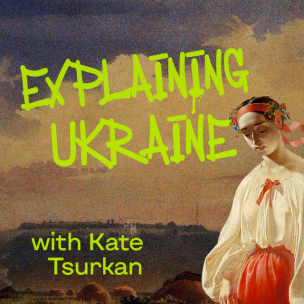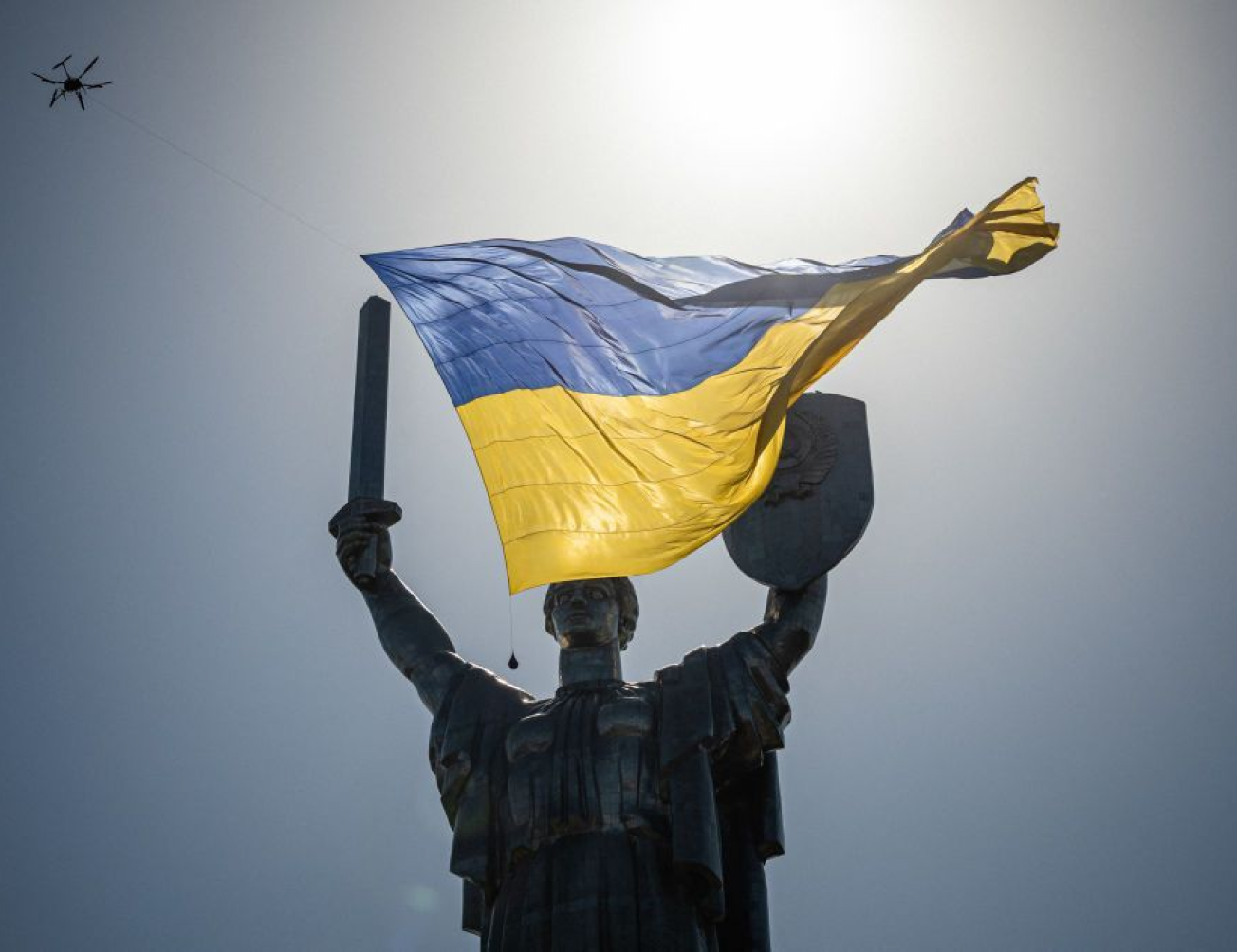
The Budapest Memorandum is a 1994 agreement by which Ukraine gave up its nuclear weapons in exchange for security assurances from the U.S., U.K., and Russia. (The Kyiv Independent)
When the Ukrainian Soviet Socialist Republic adopted the Declaration of Sovereignty in July 1990 to gain greater rights and freedoms within the Soviet Union, ridding the country of its nuclear weapons was one of its top priorities.
Ukraine had just suffered enormously from the Chornobyl nuclear power plant accident in 1986. Ukraine’s pro-independence political elites also knew that with Moscow-controlled nuclear weapons on its territory, Ukraine could never be fully independent.
Volodymyr Vasylenko, a member of the civil-political movement Rukh and one of the drafters of Ukraine's Declaration of Sovereignty, said at the time that “by being a nuclear power, (Ukraine) could not attain full independence."

Within a year, Ukraine found itself a newly-independent state and, with that, the inheritor of the world’s third-largest nuclear arsenal that included over 5,000 strategic and tactical weapons.
The question was no longer one of becoming a nonnuclear and neutral state in order to get rid of Soviet forces, including nuclear forces, from the territory of Soviet Ukraine. It was now one of whether or not Ukraine as an independent country should even give up its nuclear weapons at all, and if so, at what cost.
From 1991, Ukraine engaged in diplomatic relations with the West and Russia that led to Ukraine signing the Treaty on the Non-Proliferation of Nuclear Weapons (NPT) and the Budapest Memorandum, which extended security assurances to Ukraine in return for moving warheads to Russia.
Since Russia invaded Ukraine in 2014, flagrantly violating the memorandum, many have wondered if Ukraine made a fatal mistake in giving up its nuclear weapons and if the West was wrong to demand that Ukraine do so.
There is no agreement on whether or not Ukraine’s nuclear disarmament was a mistake. While some have argued Ukraine could have gotten more than thin security assurances from the West, others have hailed Ukraine’s nuclear disarmament as a victory of nuclear non-proliferation.
What factors led Ukraine to give up its nuclear weapons?
There were several reasons why Ukraine ultimately decided to give up its nuclear arsenal: the need for financial assistance from the West in the face of an economic crisis, legitimacy as a new state on the global stage, fear of retaliation from Russia, technical problems with managing and controlling the nuclear weapons on its territory, and security assurances.
By 1993, inflation in Ukraine was over 10,000%, and production had declined by as much as 50% since 1990, according to various estimates. The budget deficit stood at 20% of GDP, and Ukraine’s balance-of-payments deficit was over $3 billion.
The United States, for its part, was not keen on seeing decades of efforts working with the Soviet Union to curb the spread of nuclear weapons go to waste. Ukraine was greatly in need of financial assistance, which the U.S. was prepared to offer in exchange for Ukraine offering up its nuclear arsenal. By 1994, Ukraine had become the third largest recipient of U.S. foreign aid.

The Ukrainian state was also looking for recognition from the global community as a newly formed independent country. Engaging seriously on the topic of denuclearization and nuclear nonproliferation gave Ukraine access to high-level Western officials, raising its status on the global stage. Refusing to play along with the international order of nuclear non-proliferation could have isolated Ukraine in a time of need.
And then there was the problem of Russia, which was hardly enthusiastic about the appearance of an independent Ukrainian state. Many of the controls for the nuclear weapons on Ukraine’s territory were in Moscow’s hands. Refusing to give up the weapons could have caused a confrontation with Russia that all parties involved were hoping to avoid.
It was, however, the prospect of security guarantees from the U.S., the U.K., and Russia through the Budapest Memorandum that gave Ukraine the final push it needed to sign the NPT and agree to allow the transfer of its nuclear weapons to Russia.
Many believed and continue to argue the security guarantees in the memorandum were worth little more than the paper they were printed on. Others have argued that the fact that three of the world’s superpowers had agreed to offer security guarantees to Ukraine lent it much-needed credibility when some were questioning its new statehood.
What did Ukraine get in exchange for giving up its nuclear weapons?
Ukraine sought and received (to varying degrees) three types of assurances in exchange for its nuclear weapons: compensation for its nuclear weapons and removing them and security guarantees.
The Ukrainian government sought compensation for the value of the highly-enriched uranium in the nuclear warheads that could be used for fuel for nuclear reactors, which it did receive from Russia.
Ukraine also wanted financial assistance in eliminating its intercontinental ballistic missiles, ICBM silos, and bombers, which was almost impossible for Ukraine to cover the cost of at the time given the economic situation. The U.S. agreed to provide the funding for their removal.

Finally, Ukraine sought security guarantees or assurances in exchange for giving up its nuclear weapons. It received assurances in the Budapest Memorandum signed in 1994, which committed the U.S., U.K., and Russia to “refrain from the threat or use of force against the territorial integrity or political independence of Ukraine.”
The signatories also “reaffirmed their commitment” to “respect the independence and sovereignty and the existing borders of Ukraine and with the agreement vowed that, if any aggression did occur, the signatories would seek immediate United Nations Security Council action to assist Ukraine.
Kyiv had hoped to get legally binding guarantees that would have promoted a formal treaty ratified by the U.S. Senate, instead of just the assurances that were in the final memorandum. U.S. officials of that time have said that Washington was not prepared to offer Ukraine these types of guarantees.
Was giving up nuclear weapons a mistake?
The tragedy of Russia’s war has led some to wonder if Ukraine did not make a fatal mistake in giving up its nuclear weapons following independence. It is difficult to imagine that Russia would have invaded had Ukraine been in possession of nuclear weapons.
Not to mention, some of the weapons that Russia is using against Ukraine in its full-scale invasion are likely those that Ukraine relinquished to Russia in the 1990s as part of the Budapest Memorandum.
Russia’s invasion has led some to criticize the value of the Budapest Memorandum. President Volodymyr Zelensky himself has questioned the agreement and has said the assurances in it have not held up.

There are those, such as Yuri Kostenko, politician and leader of the Ukrainian People's Party who was involved in Ukraine’s nuclear disarmament, who argues in his memoir about that time period that Ukraine could have received more in exchange for its nuclear weapons. In Kostenko’s view, Russia and the U.S., who knew little about Ukraine and its history, ultimately found an agreement that served their interests.
Archival documents published over the years, some within the last six months, point to a complete lack of concern among then-U.S. President Bill Clinton’s administration of Ukraine’s very real security concerns about its Russian neighbor that was already throwing around territorial claims at the time of Ukraine’s independence.
Clinton himself in April 2023 said that he regretted persuading Ukraine to give up its nuclear arsenal.
Others have hailed Ukraine, along with Belarus and Kazakhstan, also inheritors of Soviet nuclear arsenals, signing onto the NPT and committing to being non-nuclear states as a victory for nuclear non-proliferation.
















